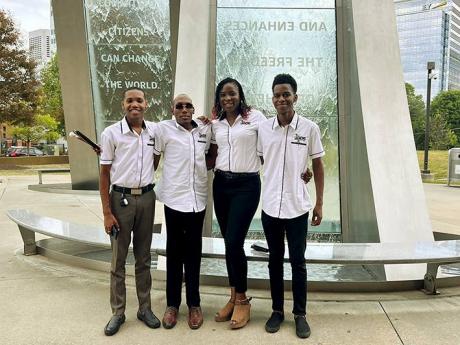University of West Georgia hosts Jamaican debate delegation
Three Jamaican representatives who participated in a debate and cultural exchange programme at The University of West Georgia (UWG) in the USA have described the experience as memorable, and having ‘delivered richly in its educative and transformative value’.
From April 4 to April 10, 2023, Germaine Barrett, executive director, Jamaican Association for Debating and Empowerment (JADE) Limited, and debate coach at the University of Technology, Jamaica (UTech); Rushana Jarrett, special projects manager, JADE, and debate staff facilitator at UTech; Enroy Madourie, development assistant at JADE; and Jadon Hewitt, deputy programmes manager at JADE, were engaged in the programme.
Integral to the occasion was a public debate where UWG President Dr Brendan B. Kelly, Pennsylvania’s
Westminster College President Dr Kathy Brittain Richardson, Westminster Speech and Debate Society
Advisor Dr Randy Richardson, senior administrators at UWG, students, and other specially invited guests were in attendance. It was moderated by Dr Michael Hester, chairman of the JADE board of directors, and director of UWG Debate. Dr Hester was also the chaperone for the JADE-UTech delegation.
The debate, dubbed the UWG President’s Great Debate, was principally between UWG and Westminster College. They spoke on the motion, ‘On balance, social media is beneficial for the United States as a democratic society’. Jadon Hewitt sided with two UWG students as the proposition, while Enroy Madourie and two Westminster College students comprised the opposition.
The proposition’s main argument was that by allowing more people to have a more direct voice, social media was aiding democracy. They cited marginalised groups, such as the Disabled Women’s Network, “whose voices were amplified through social media as proof of social media’s benefits to the US democratic system”. The opposition maintained that the ills of society, such as “political polarisation, radicalisation and increased disinformation are exaggerated by social media”, which they contended is an example of social media’s damaging impact on America’s democracy.
ENGENDER PUBLIC INTEREST
Members of the audience were allowed to ask questions related to the motion, after which Madourie delivered an opposition rebuttal speech. He questioned the nature of human morality and advanced the idea that social media showcased the worst side of human beings. He argued that social media do not care about democracy as it is profit-driven, thus highlighting the societal ills which his team had initially mentioned.
Hewitt concluded the debate with a rebuttal speech on behalf of the proposition. His main contest was that “despite the reprehensible nature of the ideas being expressed through social media, the proliferation of these ideas underscore the growing health of a democratic society”. He underscored the unique advantages that social media provide to marginalised and minoritised groups, to get their voices heard within the public space.
The debate was not adjudicated, as it was “designed to engender public interest, understanding and discussion of the issue”. This is how public debates are often formatted, Barrett told The Gleaner. “This debate and cultural exchange delivered richly in terms of its educative and transformative value. It was an overall mind-expanding affair that did not compromise on amazing fun, food and frivolities. This is what an expedition of this nature should be all about, loads of experiential learning in an exhilarating environment,” he added.
The delegation also visited the National Centre for Civil and Human Rights, the Georgia Aquarium and participated in an intense public speaking workshop. According to Barrett, the public speaking workshop provided an opportunity for participants to sharpen their oratorical skills and learn intermediate and advanced public speaking strategies. It comprised three segments: persuasive, dramatic interpretation, and impromptu speeches.
“Of all the memorable experiences had on this exchange the most potent and lasting is that had at the National Centre for Civil and Human Rights. From reviewing the abominable Jim Crow Laws, to being mesmerised, enraged and inspired by the struggles of countless people across the world in their fight for freedom and human rights, my mind and passions were thoroughly stimulated,” Barrett said.

